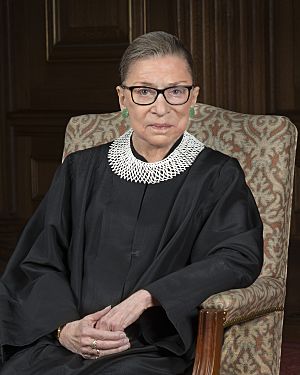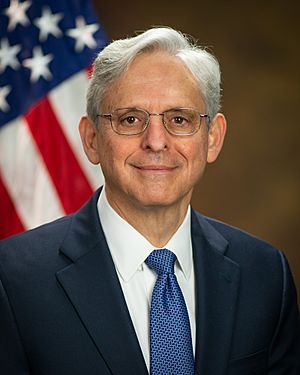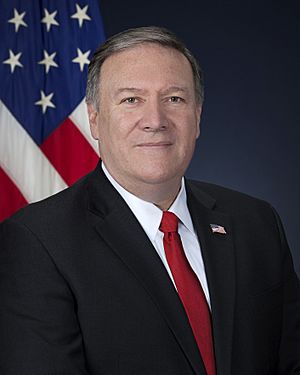Harvard Law Review facts for kids
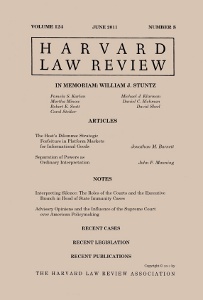 |
|
|
Abbreviated title (ISO 4)
|
Harv. Law Rev. |
|---|---|
| Discipline | Law |
| Language | English |
| Publication details | |
| Publisher |
The Harvard Law Review Association (United States)
|
|
Publication history
|
1887–present |
| Frequency | 8/year |
|
Impact factor
(2018) |
4.680 |
| Indexing | |
| ISSN | 0017-811X |
| LCCN | 12032979 |
| CODEN | HALRAF |
| OCLC no. | 46968396 |
| Links | |
|
|
The Harvard Law Review is a special magazine about law. It is created by a group of students at Harvard Law School. This magazine is very important in the world of law. In 2015, it was ranked as the top law journal out of 143 others.
The Harvard Law Review comes out every month from November to June. The November issue is special because it looks back at the important decisions made by the Supreme Court of the United States in the past year.
The journal also has an online part called the Harvard Law Review Forum. This part shares new ideas and responses to the articles in the main journal. Being part of the Harvard Law Review is a big honor at Harvard Law School. Students can also join the Harvard Legal Aid Bureau or the Board of Student Advisors. If a student is chosen for more than one of these groups, they can only pick one.
The Harvard Law Review Association works with other top law journals. These include the Columbia Law Review, the University of Pennsylvania Law Review, and the Yale Law Journal. Together, they publish The Bluebook. This book is the main guide for how to properly refer to laws and court cases in the United States.
Contents
History of the Review
The Harvard Law Review first came out on April 15, 1887. This makes it one of the oldest law magazines run by students in the U.S. A big reason it started was because of Louis Brandeis. He was a recent graduate of Harvard Law School. He later became a Justice on the Supreme Court of the United States.
How Editors Were Chosen
From the 1880s to the 1970s, students were chosen to be editors based on their grades. The student with the best grades became the president of the Review.
Over time, more diverse students joined the Review.
- The first female editor was Priscilla Holmes (1953–1955).
- The first woman to be president was Susan Estrich (1977). She later became active in politics.
- The first non-white president was Raj Marphatia (1988).
- The first African-American president was Barack Obama (1991). He later became the 44th President of the United States.
- The first openly gay president was Mitchell Reich (2011).
- The first Latino president was Andrew M. Crespo.
- The first female African-American president, ImeIme Umana, was chosen in 2017.
Where the Review Works
Gannett House has been the home of the Harvard Law Review since the 1920s. It is a white building built in the Greek Revival style. This style was popular in New England in the mid-to-late 1800s. Before Gannett House, the journal was in Austin Hall at the Law School.
Becoming an Editor Today
Since the 1970s, grades are no longer the only way to become an editor. Today, students are chosen based on their first-year grades and a writing competition. This competition happens at the end of their first year. The writing competition has two parts:
- Editing an article that has not been published yet.
- Analyzing a recent case from the United States Supreme Court or a Court of Appeals.
The writing competition entries are graded without knowing who wrote them. This makes sure the process is fair. Fourteen editors are chosen based on their grades and competition scores. Twenty editors are chosen only based on their competition scores. The last twelve editors are chosen in a special way. This can include helping the Review have a diverse group of members. The president of the Harvard Law Review is chosen by the other editors.
Student Writings and Subscriptions
For a long time, student articles published in the Harvard Law Review have been called "notes." They are not signed by the author. This is because many people on the Review help make each article ready for publishing.
In 2012, the Harvard Law Review had 1,722 paid subscriptions.
A Recent Event
In November 2023, the Harvard Law Review decided not to publish an article by a Palestinian student named Rabea Eghbariah. The online leaders of the Law Review had asked Eghbariah to write the article. Reports said that the president of the Law Review, Apsara Iyer, and most of the leadership, delayed publishing the article. They said this was due to "safety concerns and the desire to deliberate with editors." The article was not published by the Law Review, but it was later published in The Nation. Twenty-five editors from the Law Review disagreed with this decision. They said it was an "unprecedented decision [that] threatens academic freedom." They felt it stopped certain viewpoints from being shared.
Famous Alumni
Many important people have been part of the Harvard Law Review.
President of the United States
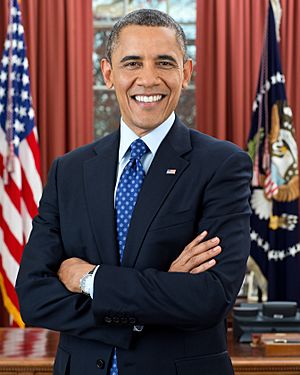
- Barack Obama, who was president of volume 104.
Supreme Court Justices
- Stephen Breyer, who was an articles editor.
- Felix Frankfurter
- Ruth Bader Ginsburg, who was an editor for one year.
- Ketanji Brown Jackson, who was a supervising editor.
- Elena Kagan, who was a supervising editor.
- John G. Roberts Jr., who was a managing editor.
- Antonin Scalia, who was a notes editor.
- Edward Sanford
Other Important Judges
- David J. Barron, a judge for the United States Court of Appeals for the First Circuit.
- Michael Boudin, a judge for the United States Court of Appeals for the First Circuit.
- Henry Friendly, a judge for the United States Court of Appeals for the Second Circuit.
- Learned Hand, a judge for the United States Court of Appeals for the Second Circuit.
- Richard Posner, a judge for the United States Court of Appeals for the Seventh Circuit.
Cabinet Secretaries
- Dean Acheson, a former Secretary of State.
- Michael Chertoff, a former Secretary of Homeland Security.
- William Coleman Jr., a former Secretary of Transportation.
- Merrick Garland, the 86th United States Attorney General.
- Mike Pompeo, a former US Secretary of State.
- Elliot Richardson, who held many cabinet roles.
Other U.S. Government Officials
- Paul Clement, a former U.S. Solicitor General.
- Ted Cruz, a U.S. Senator from Texas.
- Ron Klain, Chief of Staff to President Joe Biden.
- Jamie Raskin, a U.S. Representative from Maryland.
- Robert A. Taft, a U.S. Senator from Ohio.
Other Government Officials
- Allan Gotlieb, a former Canadian Ambassador to the United States.
- Eliot Spitzer, a former Governor of New York.
- Robert Stanfield, a former leader of Canada's Official Opposition.
Academics
- Derek Bok, a former president of Harvard University.
- Amy Chua, a professor at Yale Law School.
- Annette Gordon-Reed, a professor at Harvard Law School and a Pulitzer Prize winner.
- Harold Koh, a former Dean of Yale Law School.
Other Attorneys
- Joe Flom, a famous lawyer.
- Kenneth Chesebro, a lawyer involved in the 2020 election events.
Writers and Journalists
- Phil Graham, a former publisher of The Washington Post.
- Archibald MacLeish, a Pulitzer Prize-winning poet.
- Jeffrey Toobin, a well-known journalist.
Other Alumni
- Rob Manfred, the commissioner of Major League Baseball.
- Nadine Strossen, a former president of the American Civil Liberties Union.
See also
- Harvard Law Record
- Hart–Fuller debate
 | Emma Amos |
 | Edward Mitchell Bannister |
 | Larry D. Alexander |
 | Ernie Barnes |


